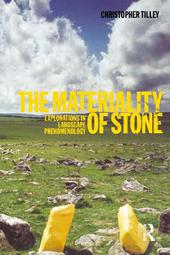
|
The Materiality of Stone: Explorations in Landscape Phenomenology
Paperback / softback
Main Details
| Title |
The Materiality of Stone: Explorations in Landscape Phenomenology
|
| Authors and Contributors |
By (author) Christopher Tilley
|
| Physical Properties |
| Format:Paperback / softback | | Pages:264 | | Dimensions(mm): Height 234,Width 156 |
|
| Category/Genre | World history - BCE to c 500 CE
Archaeology by period and region |
|---|
| ISBN/Barcode |
9781859738979
|
| Classifications | Dewey:930.14 |
|---|
| Audience | | Tertiary Education (US: College) | |
|---|
|
Publishing Details |
| Publisher |
Bloomsbury Publishing PLC
|
| Imprint |
Berg Publishers
|
| Publication Date |
1 July 2004 |
| Publication Country |
United Kingdom
|
Description
With Wayne Bennett From the silky wax qualities of the surfaces of some quartz menhirs to the wood-grain textures of others, to the golden honeycombed limestones of Malta, to the icy frozen waves of the Cambrian sandstone of south-east Sweden, this book investigates the sensuous material qualities of stone. Tactile sensations, sonorous qualities, colour, and visual impressions are all shown to play a vital part in our understanding of the power and significance of prehistoric monuments in relation to their landscapes. In The Materiality of Stone, Christopher Tilley presents a radically new way of analyzing the significance of both 'cultural' and 'natural' stone in prehistoric European landscapes. Tilley's groundbreaking approach is to interpret human experience in a multidimensional and sensuous human way, rather than through an abstract analytical gaze. The studies range widely from the menhirs of prehistoric Brittany to Maltese Neolithic temples to Bronze Age rock carvings and cairns in southern Sweden. Tilley leaves no stone unturned as he also considers how the internal spaces and landscape settings are interpreted in relation to artifacts, substances, and related places that were deeply meaningful to the people who inhabited them and remain no less evocative today. In its innovative approach to understanding human experience through the tangible rocks and stone of our past, The Materiality of Stone is both a major theoretical and substantive contribution to the field of material culture studies and the study of European prehistory.
Author Biography
Christopher Tilley Professor of Anthropology,University College London
ReviewsWinner, William A. Douglass Book Prize in Europeanist Anthropology, 2005 'This is an intriguing and original contribution to the study of ancient monuments and places. It relies on a sophisticated blend of social theory and fieldwork and will surely influence the ways in which landscape archaeology develops in the future.' Richard Bradley, University of Reading 'In this continuation of Tilley's project into phenomenology and landscape we encounter its most exciting and productive area of research; the engagement with materiality. The success of this approach can only be measured by the richness of interpretation offered for some of the most enigmatic areas of archaeological material culture, namely menhirs and rock art. Very rarely does a book provide the inspiration to go out and undertake immediate fieldwork, well this has precisely such an effect and is surely going to inspire a further generation of archaeologists and those concerned with material culture of the past to do exactly that.' Colin Richards, University of Manchester With his usual clarity in expressing complex theoretical concepts, Tilley has written another thought-provoking book that builds on his Phenomenology of Landscape. This is a valuable addition to current debates on the meanings of stone for prehistoric monument builders; it will be essential reading for all archaeologists working on the Neolithic.' Mike Parker Pearson, University of Sheffield 'Christopher Tilley's most recent book shows a new level of sophistication and integration with alternative modes of scholarship, compared with his first book on a broadly related theme of ten years earlier... [T]his book [is] a thought-provoking experience... Simon Stoddart, University of Cambridge
|